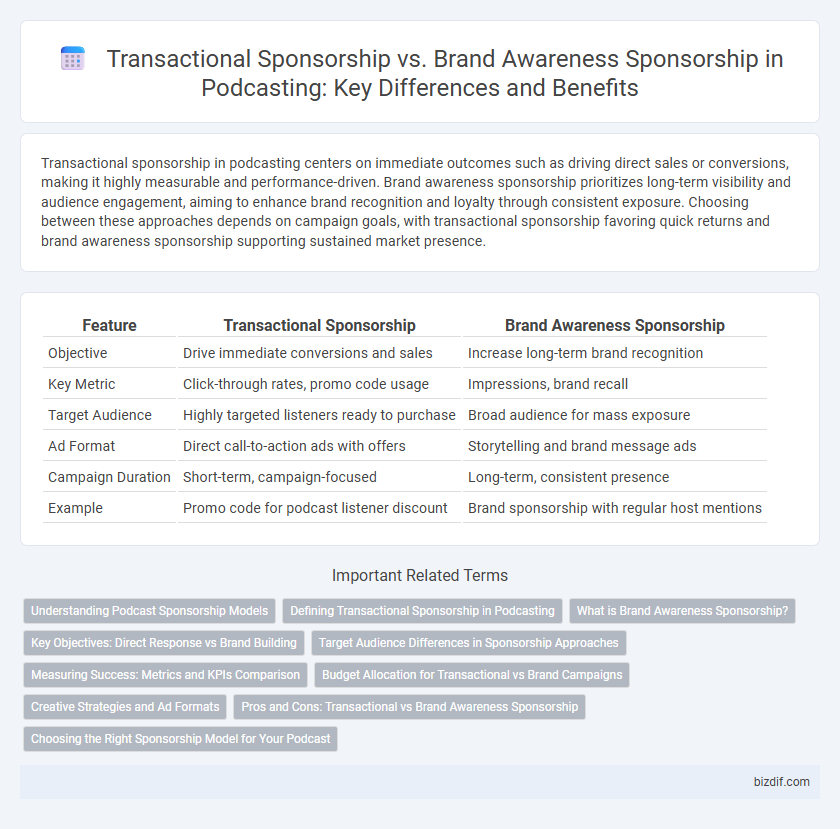Transactional sponsorship in podcasting centers on immediate outcomes such as driving direct sales or conversions, making it highly measurable and performance-driven. Brand awareness sponsorship prioritizes long-term visibility and audience engagement, aiming to enhance brand recognition and loyalty through consistent exposure. Choosing between these approaches depends on campaign goals, with transactional sponsorship favoring quick returns and brand awareness sponsorship supporting sustained market presence.
Table of Comparison
| Feature | Transactional Sponsorship | Brand Awareness Sponsorship |
|---|---|---|
| Objective | Drive immediate conversions and sales | Increase long-term brand recognition |
| Key Metric | Click-through rates, promo code usage | Impressions, brand recall |
| Target Audience | Highly targeted listeners ready to purchase | Broad audience for mass exposure |
| Ad Format | Direct call-to-action ads with offers | Storytelling and brand message ads |
| Campaign Duration | Short-term, campaign-focused | Long-term, consistent presence |
| Example | Promo code for podcast listener discount | Brand sponsorship with regular host mentions |
Understanding Podcast Sponsorship Models
Transactional sponsorship in podcasting centers on direct, measurable actions like clicks or purchases, driving immediate ROI for advertisers. Brand awareness sponsorship prioritizes long-term audience engagement and recognition, aiming to build a loyal listener base and amplify brand visibility. Understanding podcast sponsorship models enables marketers to align their campaign objectives with either performance-driven or brand-building strategies for optimal impact.
Defining Transactional Sponsorship in Podcasting
Transactional sponsorship in podcasting involves direct, measurable actions such as clicks, conversions, or sales generated from the sponsorship, emphasizing immediate return on investment for advertisers. This model prioritizes performance-based outcomes where advertisers pay based on listener engagement metrics or completed transactions. Unlike brand awareness sponsorship, transactional sponsorship provides clear attribution to specific campaign results within podcast advertising.
What is Brand Awareness Sponsorship?
Brand Awareness Sponsorship in podcasting focuses on increasing recognition and recall of a brand rather than driving immediate sales or actions. This type of sponsorship leverages the podcast's audience engagement and trust to build long-term brand loyalty and top-of-mind awareness. Metrics for success include reach, impressions, and listener sentiment rather than direct conversions.
Key Objectives: Direct Response vs Brand Building
Transactional sponsorships target immediate actions such as clicks, sign-ups, or purchases, driving measurable direct response outcomes through call-to-action strategies. Brand awareness sponsorships prioritize long-term brand building by enhancing recognition, trust, and loyalty among podcast audiences without immediate conversion demands. Understanding these key objectives helps marketers choose sponsorship types aligned with campaign goals and performance metrics in podcast advertising.
Target Audience Differences in Sponsorship Approaches
Transactional sponsorship targets a specific audience segment with immediate purchase intent, focusing on measurable actions such as clicks or conversions. Brand awareness sponsorship aims at a broader audience to build long-term recognition and loyalty, emphasizing reach and engagement metrics. Understanding these target audience differences allows podcasters to tailor content and sponsorship strategies for maximum impact.
Measuring Success: Metrics and KPIs Comparison
Transactional sponsorship in podcasting measures success primarily through direct response metrics such as conversion rates, click-through rates, and promotional code redemptions, enabling precise tracking of immediate ROI. Brand awareness sponsorship emphasizes long-term engagement indicators, including audience reach, listener frequency, brand recall surveys, and social media sentiment analysis to evaluate shifts in perception. Comparing these KPIs highlights that transactional sponsorships prioritize measurable sales impact, whereas brand awareness sponsorships focus on cultivating broader brand engagement and visibility.
Budget Allocation for Transactional vs Brand Campaigns
Budget allocation for transactional sponsorships typically prioritizes direct response metrics, focusing resources on clear call-to-action outcomes such as sales or sign-ups, with an emphasis on short-term ROI measurement. In contrast, brand awareness sponsorships allocate budgets toward long-term audience engagement and brand recall, often investing in broader reach and frequency to strengthen brand positioning without expecting immediate conversions. Marketers often balance these budgets to optimize both immediate revenue impact and sustained brand equity growth within podcast advertising strategies.
Creative Strategies and Ad Formats
Transactional sponsorships leverage direct response ad formats such as promo codes and time-sensitive offers to drive immediate user actions, optimizing measurable ROI through clear call-to-actions. Brand awareness sponsorships prioritize creative storytelling and native ad formats, including host-read endorsements and branded content segments, to build emotional connections and long-term brand recall. Effective campaigns integrate dynamic ad insertion and compelling narrative techniques tailored to audience demographics and listening behaviors for enhanced engagement.
Pros and Cons: Transactional vs Brand Awareness Sponsorship
Transactional sponsorship in podcasting offers immediate measurable returns through direct calls-to-action, making it ideal for short-term sales boosts, but it may alienate listeners if overused or too sales-heavy. Brand awareness sponsorship builds long-term audience trust and loyalty by subtly integrating messages, though its impact is less quantifiable and results may take longer to materialize. Choosing between transactional and brand awareness sponsorship depends on campaign goals, with transactional favoring quick conversions and brand awareness focusing on sustained engagement.
Choosing the Right Sponsorship Model for Your Podcast
Transactional sponsorships prioritize immediate conversions and sales by linking podcast ads to specific calls-to-action, making them ideal for direct-response campaigns. Brand awareness sponsorships focus on enhancing long-term recognition and audience trust through consistent exposure, benefiting podcasts aiming to build a loyal listener base. Selecting the right sponsorship model depends on your podcast's goals, audience demographics, and whether you seek quick measurable results or sustained brand engagement.
Transactional Sponsorship vs Brand Awareness Sponsorship Infographic

 bizdif.com
bizdif.com